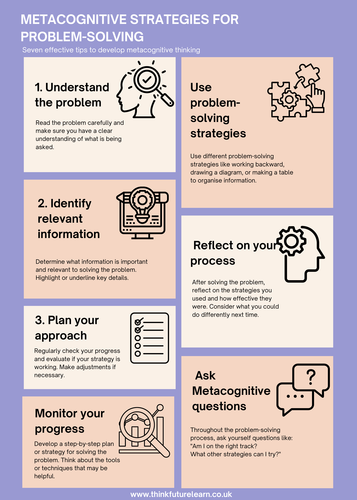

Metacognition is being aware of our thought processes through the framework of planning, monitoring and evaluating. The EEF’s Guidance on Metacognition and Self-regulation 2018 highlights the importance of teaching metacognition. Pupils can make an additional seven months progress, when metacognitive strategies are taught explicitly.
Teachers utilise metacognitive strategies to varying degrees but they are not always as explicit as they could be. In the aftermath of the global pandemic, it has become even more important to focus on the pedagogy of metacognition, to help pupils who have fallen behind.
Metacognitive thinking, for maths problem-solving, has been broken down into seven steps and has been designed to help develop metacognitive thinking explicitly, during the problem-solving process. It highlights what pupils should be thinking about when problem-solving. Pupils should follow the first three steps in order and after that it is not necessary to follow the steps in any order; they can go back and forth.
The information on this innovative metacognitive poster is research-based and evidence-informed. It forms part of a series of posters. It can be displayed, in the classroom, as a prompt for developing metacognitive thinking.
Something went wrong, please try again later.
This resource hasn't been reviewed yet
To ensure quality for our reviews, only customers who have downloaded this resource can review it
Report this resourceto let us know if it violates our terms and conditions.
Our customer service team will review your report and will be in touch.